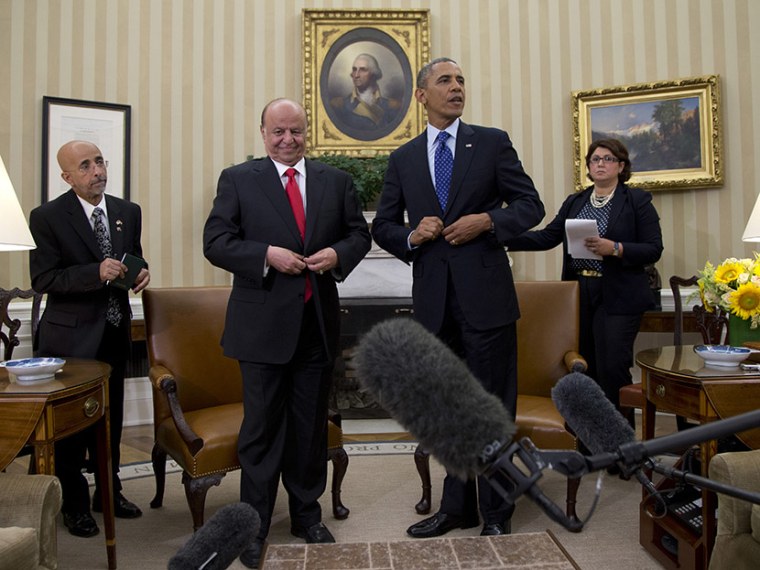President Obama appeared closer to making good on his promise to shut the detention facility at Guantanamo Bay, Cuba, after Yemen's president pledged Thursday to establish a rehabilitation program for former detainees.
In a joint statement released after President Abdo Rabbu Mansour Hadi's White House meeting, the two leaders said they "agreed to remain in close consultation" on creating a system for sending prisoners back to Yemen. "President Hadi affirmed his intention to establish an extremist rehabilitation program to address the problem of violent extremism within Yemen," a step that will be crucial to any eventual transfers. "President Obama reaffirmed his commitment to closing the Guantanamo bay detention facility," the statement read.
The statement marked the first public move toward repatriating some of the 56 Yemeni detainees since Obama first said in May that he would lift a ban on transferring the prisoners back to their home country. The Yemenis make up two-thirds of the Guantanamo prisoner population that has long cleared for release. But Obama suspended all prisoner transfers to Yemen in 2010 due to concerns over that nation's political stability and the rise of al Qaeda in the Arabian Peninsula. At the time, al Qaeda members in Yemen were being connected to several suspected plots against the United States. The capital later became engulfed in protests in 2011 as the Arab Spring swept through Sa'ana.
The U.S. government has for years launched deadly drone strikes in Yemen, which have also killed some American citizens. Anwar al-Awlaki, a U.S.-born cleric whom the government accused of inciting violence and directing attacks, was killed in September 2011. His 16-year-old son Abdulrahman al-Awlaki was killed in a separate strike two weeks later. Yemen's president at the time, Ali Abdullah Saleh, was the target of an assassination attempt in June 2011 and was eventually forced to cede power to Hadi.
Republican Sens. John McCain of Arizona and Dianne Feinstein, the California Democrat, traveled to the prison with White House Chief of Staff Denis McDonough on June 7 to review conditions there in the midst of an ongoing hunger strike that began in February. At its peak, 106 men were participating in the strike. The two senators have led the drive to reignite discussions in Congress about lifting restrictions that have made it more difficult for the administration to transfer detainees already cleared to leave the prison. Rep. Jim Moran, Virginia Democrat, told msnbc on Thursday, "We need to shut that prison down." (See video below.)
CIA director John Brennan worked closely with0 former National Security Council legal adviser Avril Haines, now his deputy at the CIA, to lay the groundwork for prisoner transfers to Yemen when he served as Obama’s counterterrorism adviser. The negotiations and deals made by Brennan could allow the White House to send men back to Yemen in small groups of two or three, which would allow the administration to gauge the success of Hadi's rehabilitation program. The fear is that former detainees will return to Yemen and become involved with al-Qaeda there. U.S. officials have long conceived of a rehabilitation program that would help the Yemenis adjust to society and reconnect with their families in a supportive and monitored environment. At one point, Brennan explored the possibility of setting up such a facility in Saudi Arabia bu the Saudi kingdom ultimately balked at the plan.
In Washington, Hadi also met with members of the Senate Foreign Relations Committee Wednesday to make a case for the release of Yemeni prisoners. The Senate held a hearing on the future of Guantanamo and detention last Wednesday, the first such hearing since 2009. The renewed interest follows recent pledges by the president to work for Guantanamo's closure. Last week, the White House announced that two detainees would be transferred to Algeria. Still, human rights groups, including Human Rights First, pushed for faster moves, saying the previous five years had been a "wasted opportunity" for Obama on this issue.
Yemen has complained about U.S. drone strikes on its territory. Obama defended the use of drones in his May speech, but they remain a staple of current counterterrorism efforts. A drone strike early Thursday killed at least three people identified by a Yemeni official as suspected militants, the third such strike in one week. Secretary of State John Kerry said Thursday that Obama "has a very real timeline" for ending drone strikes in Pakistan, and that "we hope it’s going to be very, very soon." No promises were made about ending strikes in Yemen.
Watch Rep. Moran:
